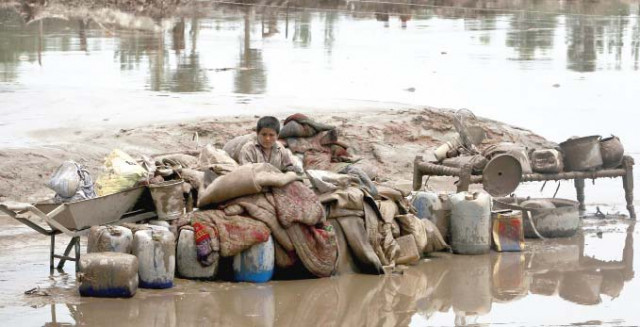Victims suffer from cholera, gastroenteritis

Pakistani officials warn that a lack of drinking water is spreading diseases, including cholera, a severe bacterial infection which primarily affects the small intestine, and say they are working to evacuate people from affected areas such as Swat, the scene last year of an offensive against the Taliban.
Syed Zahir Ali Shah, health minister for the province, said about 100,000 people, mostly children, are suffering from illnesses such as gastroenteritis which is the inflammation of the gastrointestinal tract, involving both the stomach and the small intestine resulting in acute diarrhea. It can be transferred by contact with contaminated food and water.
A spokesman for the charity World Vision, Muhammad Ali, said teams had visited those affected around the main northwestern city of Peshawar, but that those further north had been inaccessible by road.
“They don’t have drinking water or food. They said there have been some visible signs of water-borne diseases,” Ali told a news agency, warning that the death toll was likely to rise further as aid workers reached more areas.
“We are getting patients with trauma, gastroenteritis, skin diseases and dehydration,” Dr Shoaib Mohammad told the news agency at a small 20-bed mobile clinic.
Nizam Gul, a resident from Nowshera who relocated to a camp, said diarrhea was widespread especially among children, but there was no medicine available. “The relief camps set up by authorities are just showpieces, there is no food or medicine available there.”
Inaccessibility hampers relief efforts
However, the disease outbreak is not the only issue plaguing the victims of the floods. For those who have been
evacuated to safety, inaccessibility is posing an equal threat as aid workers are
finding themselves unable to get food and clean drinking water to them on time as roads and bridges have been destroyed.
“Roads, bridges, health-care facilities and schools have suffered massive damage. Main highways are cut
off as bridges across the country’s swollen northern rivers have been washed away,”
said the International Committee of the Red Cross (ICRC).
Published in The Express Tribune, August 3rd, 2010.



















COMMENTS
Comments are moderated and generally will be posted if they are on-topic and not abusive.
For more information, please see our Comments FAQ